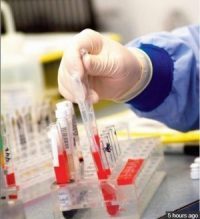- Home
- Editorial
- News
- Practice Guidelines
- Anesthesiology Guidelines
- Cancer Guidelines
- Cardiac Sciences Guidelines
- Critical Care Guidelines
- Dentistry Guidelines
- Dermatology Guidelines
- Diabetes and Endo Guidelines
- Diagnostics Guidelines
- ENT Guidelines
- Featured Practice Guidelines
- Gastroenterology Guidelines
- Geriatrics Guidelines
- Medicine Guidelines
- Nephrology Guidelines
- Neurosciences Guidelines
- Obs and Gynae Guidelines
- Ophthalmology Guidelines
- Orthopaedics Guidelines
- Paediatrics Guidelines
- Psychiatry Guidelines
- Pulmonology Guidelines
- Radiology Guidelines
- Surgery Guidelines
- Urology Guidelines
Boston: Human antibodies produced in lab for first time

BOSTON: In a first, scientists have produced human antibodies in the laboratory using a technique that could usher the rapid development of new vaccines to treat a wide range of infectious diseases.
Antibodies are produced by the body's B cells to fight off infections by bacteria, viruses, and other invasive pathogens.
When an individual B cell recognises a specific pathogen-derived "antigen" molecule, it can proliferate and develop into plasma cells that secrete large amounts of antibody capable of binding to the antigen and fending off the infection.
Researchers, including those from Harvard University and Massachusetts Institute of Technology (MIT) in the US, wanted to replicate this process in the laboratory to produce specific antibodies from B cells isolated from patient blood samples.
However, in addition to encountering a specific antigen, B cells need a second signal to start proliferating and developing into plasma cells.
This second signal can be provided by short DNA fragments called CpG oligonucleotides, which activate a protein inside B cells named TLR9.
However, treating patient-derived B cells with CpG oligonucleotides stimulates every B cell in the sample, not just the tiny fraction capable of producing a particular antibody.
Researchers, led by Facundo Batista from the Francis Crick Institute in the UK, produced specific human antibodies in the laboratory by treating patient-derived B cells with tiny nanoparticles coated with both CpG oligonucleotides and an antigen.
With this technique, CpG oligonucleotides are only internalised into B cells that recognise the specific antigen, and these cells are therefore the only ones in which TLR9 is activated to induce their proliferation and development into antibody-secreting plasma cells.
The team successfully demonstrated their approach using various bacterial and viral antigens, including the tetanus toxoid and proteins from several strains of influenza A.
In each case, the researchers were able to produce specific, high-affinity antibodies in just a few days. Some of the anti-influenza antibodies generated by the technique recognised multiple strains of the virus and were able to neutralise its ability to infect cells.
The procedure does not depend on the donors having been previously exposed to any of these antigens through vaccination or infection.
Researchers were able to generate anti-HIV antibodies from B cells isolated from HIV-free patients.
They hope that their approach will help researchers rapidly generate therapeutic antibodies for the treatment of infectious diseases and other conditions such as cancer.
"Specifically, it should allow the production of these antibodies within a shorter time frame in vitro and without the need for vaccination or blood/serum donation from recently infected or vaccinated individuals," Batista said.
"Our method offers the potential to accelerate the development of new vaccines by allowing the efficient evaluation of candidate target antigens," he said.
The research was published in The Journal of Experimental Medicine.
Next Story
NO DATA FOUND

Disclaimer: This site is primarily intended for healthcare professionals. Any content/information on this website does not replace the advice of medical and/or health professionals and should not be construed as medical/diagnostic advice/endorsement or prescription. Use of this site is subject to our terms of use, privacy policy, advertisement policy. © 2020 Minerva Medical Treatment Pvt Ltd